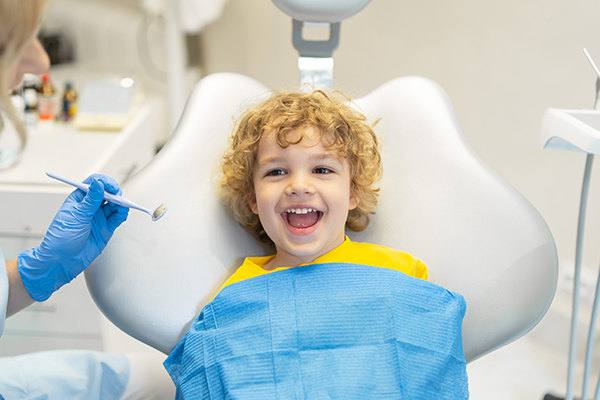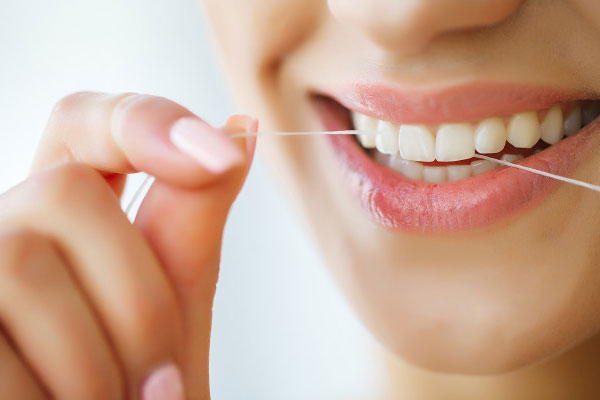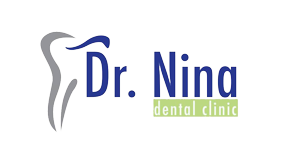Pediatric dentistry
The first visit to the dentist is of great importance and it is recommended to be done in a period of up to six months from the eruption of the first tooth in the mouth, at the latest until the end of the first year. The purpose of this early visit is to introduce the child to the dentist before he or she has any dental problems. Furthermore, regular check-ups at 6 months will help to detect any dental problems before the onset of pain.

Care of
deciduous teeth
In some cases it is necessary to make an X-ray of a particular tooth. With the help of X-rays, the presence of caries between the teeth is seen, as well as the direction of growth of the permanent teeth, ie whether the beginning of the tooth is in its place in the jaw. In early childhood, the use of fluoride is recommended, systemically and locally, and the need for them and the method of fluoridation will be determined after the examination.
After the growth of the first permanent teeth, ie the first permanent molars, it is recommended to seal the pits and fissures of the tooth as a preventive measure to prevent further tooth decay. The sealants are applied to the chewing surface of the tooth, which prevents the entry of bacteria and plaque into the fissures of the tooth.
During the examination, if an incorrect position of the permanent teeth is found, it is suggested that the child wears a fixed or mobile orthodontic appliance.

Why seal milk tooth, when it will certainly fall off?
- Some of your baby teeth will stay in your baby's mouth for up to 12 years. Broken and decayed teeth can cause pain as well as affect a child's self-esteem.
- In order to fill a tooth, the dental caries is first cleaned, then a filling is placed on the tooth. Timely filling of the teeth prevents further spread of caries deeper in the tooth and the appearance of pain.
- The most important reason for a baby tooth to stay in the mouth is to keep the space of the permanent tooth until it erupts. If the tooth is lost prematurely, the adjacent teeth may partially move to the empty space, closing the space in which the permanent tooth should erupt. Therefore, caring for deciduous teeth is just as important as caring for permanent teeth.

Cleaning of teeth
Young children are not able to brush their teeth on their own. As parents, you must do this for them. When a child starts writing, it is considered to be the period when he is mature enough to just start brushing his teeth. But still check them after each brushing to make sure they are done well.
You can start brushing your teeth before your baby teeth appear. This gives you the habit of keeping your mouth clean. The goal is to "wipe" all the soft parts - the gingiva, as well as the teeth if they have sprouted. You can do this as follows:
- Lie down your child in a comfortable place
- Use a soft toothbrush, or wrap a clean, slightly damp cotton cloth around your finger, and brush or clean the surfaces of the teeth and gums.
- Do not use toothpaste until the teeth appear in the child's mouth.
How to brush them teeth?
Step 1:
Hold the brush at a 45-degree angle to the teeth. Start by brushing the junction of the tooth with the gingiva, then continue in the direction of tooth growth.
Step 2:
Use gentle circular motions. Brush each surface of each tooth. Strong brushing can injure the gingiva, so no pressure should be applied and teeth should be brushed aggressively.
What a brush for teeth to use for your child?
It is best to use a soft toothbrush, specially designed for children. The brush head should be small and rounded. Change your toothbrush regularly, ie every 3-4 months.
What a paste for teeth to use?
- The paste must contain fluoride. Use only a small amount of the paste and make sure your child spits it out. If swallowed more often than toothpaste, it can result in fluorosis on the teeth. Therefore, children up to 6 years old should brush their teeth under supervision
- Children under the age of 3 should brush their teeth under parental supervision. The use of fluoride paste in a small optimal amount is sufficient to achieve a balance between the benefits of fluoride and the risk of developing fluorosis.
- Children 3-6 years old should be supervised by an adult when brushing their teeth, using a small amount of toothpaste the size of a pea.
Do you have to brush your teeth child before bed?
- Yes, brushing your teeth before bed is mandatory. If you do not get rid of bacteria and sugars, they will bite your child's teeth all night. Another reason is the reduced secretion of saliva at night, so brushing your teeth at bedtime is very important.
The role of food in the development of dental caries in childhood
If your child eats more sugary foods or drinks, the bacteria in his mouth use that sugar to create an acidic environment in his mouth. These acids erode the surface layer of the tooth - tooth enamel and can lead to the appearance of carious cavities on the tooth.
The damage caused by sugars depends on how much sugar is ingested and how long it stays in the mouth.
Any type of sugar causes caries, whether it is refined or natural like milk sugar.
If your baby goes to bed with a bottle of milk in his mouth, the milk stays in the mouth for a long time. Therefore, it is better to give unsweetened juice or tea before going to bed. The best drink between two meals is always water. Note that natural skis also contain sugars. If the child constantly drinks juices or eats sugary foods between meals, the teeth are constantly filled with sugars and the possibility of caries is greatly increased.
Your job as a parent is to brush your child's teeth regularly, not to stop giving the child sweets, milk or juices. However, nutrition is important for the proper growth and development of the whole organism.
Read the labels of the food products you buy. By law, each ingredient is listed by weight. Therefore, if sugars are at the top of the list of ingredients, it means that those foods contain sugar as the main ingredient.
Children often like to snack on food and chocolates between meals. Since this can not be avoided, here are some tips to reduce the harmful effects of sugar on your teeth:
- Limit the number of sugary drinks per day. It is better to drink a glass of juice once a day than to sit with a bottle of juice in your mouth all day. That way the teeth are constantly coated with sugars. Therefore, water is the best drink between two meals. Unsweetened teas are also a good choice.
- Foods rich in sugars that stay in the mouth for a long time have a great cariogenic effect. Therefore, avoid giving the child lollipops, chewing gum with sugar, hard candies, chewing gum, caramels and other sweets that are sticky and get stuck in the fissures of the teeth.
- If you give him sweets, it is best to do it immediately after a meal, because then the largest amount of saliva is excreted, which cleans the oral cavity.
Growth and development of deciduous teeth
The deciduous teeth are a total of 20 in number. Their growth ends up to 2-3 years of life. The table shows the age of each tooth.
If your child erupts teeth and you feel pain, you can help by massaging the gingiva where it should and the tooth erupts with a clean finger, or with the back of a small spoon, cooled in the refrigerator.
Under no circumstances should you use topical pain medications. Your child is small and can swallow them.
If you have a fever, talk to your GP. Teething does not make children sick and does not cause fever.
Growth and development of permanent teeth
At the age of 6, the first permanent tooth in the mouth sprouts - the first permanent molar. They are located behind the dentition of the deciduous teeth, ie behind the second deciduous molars. During this period, the resorption of the roots of the remaining deciduous teeth begins, with which they begin to shake, and after a certain time their removal takes place. Milk teeth are completely replaced by the age of 12.
The deciduous tooth should be removed when it starts to swing more (niche), and it should never be extracted by force, ahead of time. If the tooth is extracted on time, there will be less bleeding.
Because permanent teeth are yellower than deciduous teeth?
It is normal for permanent teeth to be yellower than deciduous teeth. However, in some cases, changes in the color and structure of the tooth may be due to medications your child has used, excessive fluoride use, or stroke - trauma to the deciduous tooth, which can result in damage to the conception of a permanent tooth. , and thus a change in the color and structure of the tooth.
Inflammation of the gingiva - gingivitis
Caries is the most common dental problem in childhood. But children can also get gingivitis - just like adults. This happens when the gingiva around the teeth is infected as a result of the accumulation of large amounts of dental plaque, which is the result of poor oral hygiene.
Therefore, regular flossing and flossing can prevent this. If your child's gums bleed, do not stop brushing. However, if you notice that the gingiva is bleeding again or swollen despite regular oral hygiene, consult a dentist.
Caries in childhood - circulatory caries
As soon as the teeth appear in the child's mouth, they immediately become susceptible to caries, as a result of consuming foods rich in sugars. Breast milk, cow's milk and juices - they all contain sugars that have cariogenic potential.
Young children often get circulatory caries as a result of the bad habit of going to bed with a bottle of milk, juice or sweetened tea. Frequent breastfeeding at night means that your baby's teeth are regularly soaked in sugar. Nevertheless, most breastfed children did not have a problem with circulatory caries.
Circular caries usually occurs by the age of 4. If your child also has circulatory caries, it is very important to detect it in time. Check his teeth once a month to see if there are any white spots or lines on his teeth. These spots are most often located in the neck of the tooth - near the gingiva. Dark - black spots on the teeth are also a sign that your child has caries.
If you notice any of these signs, see a dentist immediately. Early childhood caries must be detected and treated in a timely manner. Otherwise, infection and pain may occur.
If you have given your child a bottle of milk or juice, it can be really difficult to stop the habit. Here are some helpful tips:
- instead of juice or milk, put plain water in the bottle
- if the child refuses water, give a clean pacifier or rubber toy
- If that doesn't help, try diluting the milk or juice for a week or two, leaving only clean water in the bottle at the end of the second week.
Fluoride and your child
Fluoride is a mineral found in soil, water (sweet and salty) and in many nutrients. It has a positive effect on oral health by making the teeth more resistant to caries.
In some communities, fluoride is used as a preventive measure for public health, through fluoridation of drinking water to an optimal level; fluoride tablets for the use of fluoride toothpastes, mouthwashes, as well as fluoride preparations for professional use in the form of liquids and gels.
However, before using fluoride, all sources of fluoride currently in use should be considered, because although fluoride is important and makes teeth more resistant to caries, large amounts of fluoride can lead to a condition called fluorosis, which also like fluoride deficiency has adverse effects on teeth. However, controlled use of fluoride is the most important preventive measure to maintain oral health. After a dental examination, he will assess the risk of developing caries and the amount of fluoride to be used.
Suckers and finger sucking like bad habits
Sucking on the pacifier and finger / thumb? are normal habits in the first months of life, because it helps babies relax.
When your child is two or three years old, that habit should be gradually lost. If you notice that he still has the habit of sucking, then it is better to give him a lying pacifier, because you can control when you give him the pacifier, unlike thumb sucking.
never put sugar or honey on the pacifier. It can cause tooth decay. It is best for your child to leave the pacifier / sucking on their thumb completely before the permanent teeth appear in their mouth, around the age of five. Otherwise, there may be problems with the development and growth of teeth and jaws.
Preventive watering of fissures
Залевањето на фисури е одличен превентивен третман за спречување на појавата на забен кариес.
No matter how much you brush the teeth of your loved ones, the masticatory surface of the teeth is a predilection place for the development of dental caries. Given this fact, watering (sealing) these surfaces is the best prevention of caries.
To water a tooth, it needs to be healthy. Therefore, watering is recommended to be performed immediately after its emergence in the oral cavity.
What is the difference between fillings and fillings?
When there is caries on the tooth, the caries must be removed mechanically and a cavity must be made - a cavity of the tooth, which is then filled with a suitable material - fillings. for polishing, after which a suitable material - grout is applied. Let us mention that this process of filling fissures is absolutely painless.
